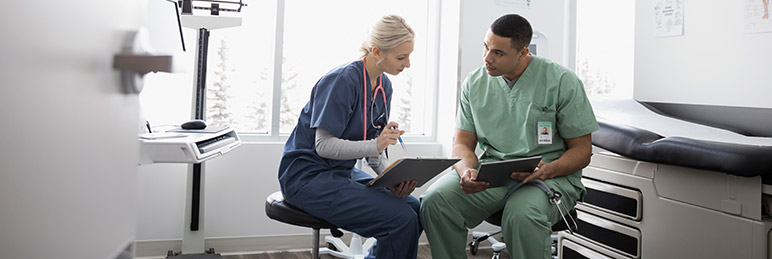Clinical Placements and Nursing Preceptors

Nursing@Georgetown’s clinical placement team partners with students to secure clinical sites and nurse preceptors near their home communities. These placements align with students’ program tracks and meet the high standards of Georgetown University School of Nursing.
Nursing@Georgetown has a vast network of health care providers and settings, including:
3,700+
locations throughout 49 states
9,800+
affiliated sites
8,600+
nurse preceptors, 50+ who are Georgetown University alumni
Take the Next Step
If you’re ready to advance your nursing career, request information about the online Family Nurse Practitioner program from Georgetown University School of Nursing.
Clinical Student Placement
Nursing@Georgetown placement specialists, Clinical Faculty Advisors, and Georgetown University School of Nursing faculty members are dedicated to helping nurse practitioner and nurse-midwifery students develop their skills as advanced practice nurses and health care providers.
The clinical placement process involves an ongoing partnership between the student and placement specialist, beginning at the point of enrollment.
Each of the program specializations offered through Nursing@Georgetown has its own clinical course requirements, preceptor needs, and objectives. For specific details, refer to each program’s curriculum.
Pairing With a Specialist
Upon enrolling, students are paired with a clinical placement specialist, who begins to research potential placement sites several months prior to contacting the student.
While every effort is made to achieve 100% successful placement, clinical placement is not guaranteed. The Nursing@Georgetown team strives to identify clinical sites that meet Georgetown University standards within a reasonable distance of their communities.
IMPORTANT NOTE: While placement is ideally within a 100 mile radius of your home, some locations may require additional travel time and costs to secure appropriate clinical/practicum placements. If there are significantly limited or lacking resources for sites in the area, relocation may need to be considered for the clinical/practicum sequence. Students’ ability to identify potential sites and preceptors in their communities is integral to this process.
Securing Clinical Placements
Through their partnership, the placement specialists and students identify potential placement opportunities. Clinical sites and preceptors are closely reviewed by Georgetown University School of Nursing faculty members to ensure the highest-quality learning experience.
Students receive clinical site information through the placement portal. The portal includes information about placement status, directions to the site, and the ability to contact the placement team on the go.
Monitoring Nurse Practitioner and Nurse-Midwifery Placements
During the placement experience, students meet with a Clinical Faculty Advisor regularly to discuss the competencies being developed, their relationship with the preceptor, and their progress at the site.
The Clinical Faculty Advisor regularly monitors clinical placement sites for quality and offers consistent mentorship to the student throughout the program.
Prepare to Become a Nursing Leader
If you’re ready to advance your career with a master’s or doctoral degree at Georgetown University, request information about the Nursing@Georgetown programs today.

What to Expect in Clinical Rotations
In clinical rotations, students will gain direct experience treating patients under the guidance of a skilled nurse preceptor.
Students and nurse preceptors will both benefit from their experience in clinical rotations. Nursing@Georgetown students will build their clinical skills and confidence as a practitioner, while preceptors develop their mentorship abilities and assist the next generation of health care workers.
Students should embrace the opportunity to gain as much as they can from their clinical preceptors and fully participate in the learning experience.
The Role of Clinical Nurse Preceptors
Georgetown University School of Nursing faculty review and approve all preceptors, who serve as highly skilled mentors for students. Nursing preceptors partner with faculty to provide clinical training, supervision, and evaluation of students in the clinical settings.
What Nurse Preceptors Do
Preceptors share valuable clinical knowledge while providing students with evidence-based clinical training and experiences that help them meet course competencies.
During students’ clinical rotations, nurse preceptors will:
- Review and discuss their students’ clinical objectives and how they will be accomplished.
- Assign patients consistent with their students’ education and experience level.
- Enable their students to perform health assessments, take histories, and perform physical exams.
- Aid their students in developing appropriate treatment plans.
- Help their students evaluate the appropriate management and treatment plans to best care for patients. This includes the interpretation of lab work and diagnostic tests.
- Provide formal evaluation and supervision of their students’ performance in practicum and clinical rotations.
Are You Ready to Get Started?
Take the next step toward gaining the clinical training to advance your career as a nursing leader. Learn more about the Nursing@Georgetown programs today.





